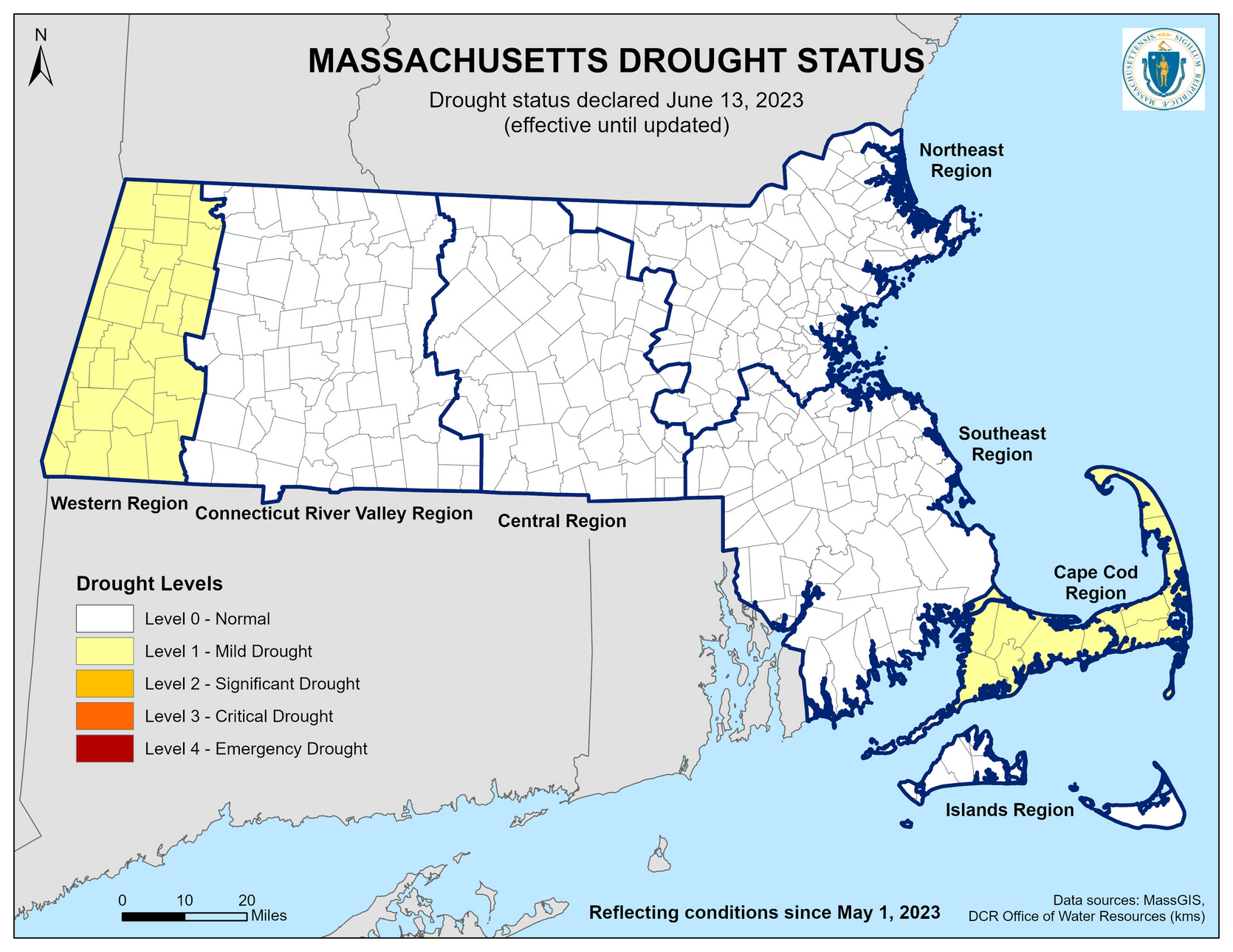- Executive Office of Energy and Environmental Affairs
- Drought Management Task Force
Media Contact for Mild Drought Conditions Declared for Western and Cape Cod Regions in Massachusetts
Danielle Burney, Deputy Communications Director

BOSTON — Energy and Environmental Affairs Secretary Rebecca Tepper declared today a Level 1-Mild Drought in the Western and Cape Cod Regions of Massachusetts following more than two months of below-normal rainfall and above-normal temperatures. All other regions of the state – Connecticut River Valley, Central, Northeast, Southeast, and Islands regions – remain in Level 0-Normal conditions. A Level 1-Mild Drought, as outlined in the Massachusetts Drought Management Plan, warrants detailed monitoring of drought conditions, close coordination among state and federal agencies, and technical outreach and assistance to the affected municipalities.
“With much of the state experiencing sporadic rainfall and higher temperatures, it’s important that we all work together to conserve water,” said EEA Secretary Rebecca Tepper. “We’re continuing to monitor conditions and any potential strains on our water systems. We ask that residents and businesses be mindful of water usage during the growing and recreational season.”
“While the Commonwealth has experienced some recent beneficial rainfall, the last 60 days have been overall slightly drier than average,” said Massachusetts Emergency Management Agency Acting Director Dawn Brantley. “Dry conditions increase the threat of brush and wildland fires, as Massachusetts saw during last year’s extended drought and widespread brush fires, so it’s especially important during the summer months to exercise caution with any open flames during outdoor activities.”
During the past several months, Massachusetts has experienced irregular rainfall events; however, state officials anticipate improvements in these areas based on rains this week. The decision to declare the Western and Cape Cod Regions a Level 1 – Mild Drought was informed by recommendations and discussions by the Drought Management Task Force (DMTF), composed of state and federal officials and other entities, which met on Thursday, June 8, 2023. The declaration will remain in effect until water levels return to normal conditions in those regions.
Those living and working within a Level 1 – Mild Drought region, including residents utilizing a private well, are encouraged to take the following actions:
For Region in Level 1 - Mild Drought
Residents and Businesses:
- Minimize overall water use;
- Limit outdoor watering to one day per week from 5:00PM to 9:00AM, or less frequently if required by your water supplier;
- Plant only local and drought-resistant species;
- Fix indoor leaks, such as from toilets, faucets, and showers, which result in more than 60 percent of indoor use;
- For larger buildings and businesses, conduct water audits to identify areas of leaks and potential water conservation opportunities;
- Minimize lawn sizes; and,
- Harvest rainwater for outdoor watering.
Communities:
- Establish a year-round water conservation program that includes public education and communication, taking advantage of the state’s library of outreach materials;
- Provide timely drought and water conservation information to local residents and businesses;
- Check emergency inter-connections for water supply; and
- Develop a local drought management plan (learn more here).
All these steps will greatly help reduce water use to ensure essential needs, such as drinking water and fire protection, are being met, habitats have enough water to support their natural functions, and sustain the Commonwealth’s water supplies. The Massachusetts Department of Environmental Protection (MassDEP) will continue to provide technical assistance to communities on managing systems, including assistance on the use of emergency connections and water supplies.
“While rain has been plentiful this spring in many areas of the state, that has not been the case in the western region or on the Cape,” said MassDEP Commissioner Bonnie Heiple. “Now is the time to implement sound conservation measures to manage water demands and help minimize larger problems later in the summer should dry conditions continue.”
The Drought Management Task Force will meet again on Thursday, July 6, 2023, at 10:00 am. State agencies will continue to closely monitor and assess conditions across the state, coordinate any needed dissemination of information to the public, and help state, federal, and local agencies prepare additional responses that may be needed in the future. For further information on water conservation and what residents can do, visit the Executive Office of Energy and Environmental Affairs’ drought and water conservation pages.
###